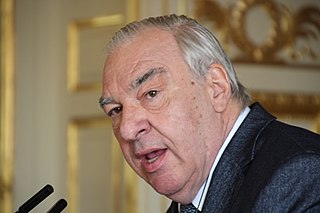Related Research Articles
The Prix Théophraste-Renaudot or Prix Renaudot is a French literary award.

Jean-Philippe Toussaint is a Belgian novelist, photographer and filmmaker. His books have been translated into more than twenty languages and he has had his photographs displayed in Brussels and Japan. Toussaint won the Prix Médicis in 2005 for his novel Fuir, second volume of the « Cycle of Marie », a four-tome chronicle published over ten years and displaying the separation of Marie and her lover. His 2009 novel La Vérité sur Marie, third volume of the cycle, won the Prix Décembre.
The grand prix de l'Imaginaire, until 1992 the grand prix de la science-fiction française, is a French literary award for speculative fiction, established in 1972 by the writer Jean-Pierre Fontana as part of the science fiction convention of Clermont-Ferrand.
The Prix du Meilleur Livre Étranger is a French literary prize created in 1948. It is awarded yearly in two categories: Novel and Essay for books translated into French.

The 6th Cannes Film Festival was held from 15 to 29 April 1953. The Grand Prix of the Festival went to The Wages of Fear by Henri-Georges Clouzot. The festival opened with Horizons sans fin by Jean Dréville.

Didier Decoin is a French screenwriter and writer awarded the Prix Goncourt in 1977.

Patrick Grainville is a French novelist.

Kitty Crowther is a Belgian illustrator and writer of children's books. For her career contribution to "children's and young adult literature in the broadest sense" she won the 2010 Astrid Lindgren Memorial Award from the Swedish Arts Council, the biggest prize in children's literature.
Christian Giudicelli is a French novelist and literary critic. His seventh novel, Station balnéaire, was awarded the 1986 Prix Renaudot. Guidicelli is one of the eight jury members of the French literary award Prix Contrepoint.
Jean-Marc Roberts was a French editor, novelist, and screenwriter.
André Hardellet was a French poet and writer. He was the 1974 winner of the Prix des Deux Magots.
The Prix Victor-Rossel is a literary award in Belgium that was first awarded in 1938. The award was created by three people associated with the newspaper Le Soir: the owner Marie-Thérèse Rossel, the manager Lucien Fuss and the editor-in-chief, Charles Breisdorff.
Louis Dubrau was a Belgian writer.
The Prix du Quai des Orfèvres is an annual French literature award created in 1946 by Jacques Catineau. It goes to an unpublished manuscript for a French-language police novel. The selected novel is then published by a major French publishing house, since 1965 Fayard. The jury is led by the chief of the Prefecture of Police of Paris. The name of the award refers to the headquarters of the Paris police, located at 36, quai des Orfèvres.
Irène Stecyk is a Belgian writer.
The prix Erckmann-Chatrian is a literary award from Lorraine, awarded every year since 1925 in memory of the literary duo Erckmann-Chatrian. It rewards a written prose work by someone form Lorraine or about Lorraine. It is often nicknamed the "Goncourt lorrain". The jury consists of literary figures of the four Lorraine departments.
The prix littéraire de la vocation, established in 1976 by the fondation Marcel-Bleustein-Blanchet pour la vocation, is intended to help a young French-speaking novelist aged 18 to 30 years.
The Prix Jean-Freustié is a French literary prize created in 1987 by Christiane Teurlay-Freustié, second wife of writer and publisher Jean Freustie (1914–1983) to which it pays tribute, and his friends Nicole and Frédéric Vitoux as well as writer Bernard Frank. It rewards a French-speaking writer for a prose work: novel, short stories, autobiography, biography or essay. The prize is awarded annually.
Arnaud Guillon is a contemporary French writer, the winner of the Prix Roger Nimier in 2000 for his novel Écume Palace and the Prix Henri de Régnier in 2015 for Tableau de chasse, une passion très coupable.
Events from the year 2002 in Belgium
References
- ↑ "Bernard Quiriny (faculty profile)" (in French). Law Department of University of Burgundy. Retrieved 7 Dec 2013.
- ↑ "Chronic'art: C'est quoi ?" (in French). Chronic'art. 2013. Retrieved 7 Dec 2013.
- 1 2 Clermont, Thierry (5 April 2012). "Bernard Quiriny: Une collection très particulière" (in French). Le Figaro. Retrieved 7 Dec 2013.
- 1 2 "Publisher's Description: Les assoiffés" (in French). Seuil.com. 2010. Retrieved 7 Dec 2013.
- ↑ "Crtique : Monsieur Spleen" (in French). Le Magazine Littéraire. 30 Apr 2013. Archived from the original on 2013-06-11. Retrieved 11 Dec 2013.
- ↑ "Palmares 2008" (in French). Le Prix du Style. 2013. Retrieved 7 Dec 2013.
- ↑ "Portfolios, Littérature : Prix Victor Rossel" (in French). LeSoir.be. 2013. Retrieved 7 Dec 2013.
- ↑ "Palmares 2013" (in French). Grand Prix de l'Imaginaire. 2013. Archived from the original on 2013-12-16. Retrieved 7 Dec 2013.
- ↑ "Publisher's Description: Monsieur Spleen: Notes sur Henri De Régnier" (in French). Seuil.com. 2013. Retrieved 7 Dec 2013.